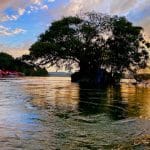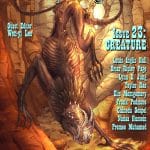I want you to imagine you’re me. It’s 2004, and you’re hard at work in Alberta’s boreal forest, surveying vegetation and hunting for rare species of wildlife and plants. In the distance, someone’s black labrador leaps into the river and starts paddling excitedly towards you. “Aww,” you say.
Your coworker squints as it swims closer. “Oh,” he says, his tone unreadable. “That’s not a dog.”
He’s right. Suddenly you are exquisitely aware of yourself as an animal: no fangs, no claws, no horns. No protective scales, no bristly hide, no venom, toxins, or sting. Your mental categorization of yourself—running in your subconscious at all times—moves to the forefront and informs you that you need to delete the tags denoting you as a worker, scientist, human. You are none of those things now. Possibly, you are a meal. You have abruptly lost a certain sense of yourself.
You see how fast the current is moving. What kind of creature can you become in the next thirty seconds?
This isn’t part of a Voight-Kampff test; it isn’t meant to gauge compassion or empathy. The answer won’t distinguish a human from a manufactured thing. But whatever the answer is, it tells us the most important thing about ourselves: What makes a creature? Or, put another way: What makes us not a creature?
Creatures live in a liminal landscape of the mind. The fluid, porous borders are composed of culture, habit, history, semiotics, language, and, yes, stories. A creature is an animal, yes? No, not an animal; it has qualities that no animal has. Then a creature is a human? No, not strictly a human, either. A creature exists between animal and human, defined by the qualities we assign to both. Those qualities can shift at any second.
A human being is a human—a precious, valuable being unlike any other, whose life must be unquestioningly preserved—until bitten by a zombie, at which point they become a creature and can be killed at once without hesitation or guilt. A human being is a human until several dead individuals are disassembled and rearranged into Frankenstein’s very much alive monster, something that everyone wants to flee or kill on sight.
It seems axiomatic that losing one’s status as a human is enough to become a creature (or monster). We are supposed to fear and loathe the loss of it, as we would fear and loathe giving up any part of our privilege or identity. Because how could it be better to be a creature than a human? Why should we desire that transformation?
Let’s look at it another way—let’s enter that liminal space from the other direction, from animal or monster gaining qualities of humanity. Is a mermaid a fish or a human? Can we call a mermaid a creature? What about other things in stories that are partly human and partly animal? The minotaur is meant to be a cautionary tale about hubris and respecting the gods; but a sphinx is just a sphinx, as a mermaid is a mermaid. The animal-headed gods of ancient Egypt possessed human bodies. Why? Can a god be a creature too? Does divinity exempt them?
To be a creature, it seems we must lose humanity if we have it, or gain it if we don’t. And now we find we’re getting into those uncomfortable spaces where art often takes us—into another strange, twilight space next to the land of creatures. A creature story explores humanity as all stories explore humanity. But here it is a transitive property, almost fungible.
In the dim light we study the coins cupped in our hands, wondering nervously who will take them from us, or give them to us: is intelligence what makes us human? What kind of intelligence? There are so many. Animals have most of them too. The ability to remember, problem-solve, predict, adapt, calculate, navigate, master and administer our instincts—those are found everywhere. Intelligibility, communication? Not necessarily; we can talk to the sphinx, but not to the zombie. And we’re not even sure whether Mothman can talk. Behaviour? Adherence to social norms? If we stop acting human, will we suddenly be declared creature? What about the medieval travelers who returned to Europe hysterically referring to real human beings as creatures? Or making up humanoids that didn’t exist—the cynocephali, blemmyae, sciopods, astomats. Who gets to say who’s human? Does the question make us squirm? It should.
My sense (unscientific, vaguely defined) is that we want creatures in our stories to tell us what we are, to shine a light on our responses to creaturely traits, to make us hold those feelings in our palms and feel the edges and weight. In Planet of the Apes, what did we feel when Caesar started talking—when he transitioned from animal to creature? I don’t know about you, but even though I knew it was coming—I’d seen the trailers, I knew the gist of the movie—I felt a deep thrill of discomfort, unease, anticipation. What does it mean if an animal can talk—if it takes one of those coins out of our hands? Why does it feel so different from the charming, humanistic talking animals of Disney movies? When King Louis talks in The Jungle Book, we laugh, because the animals are one-to-one proxies for humans, not really creatures. When the wizard Howl transforms into a black-feathered monster, meanwhile, we feel a strange mix of things: pity, fear, curiosity, hope. He is not a creature that will threaten us, despite his appearance. We knew him as a human; his changed status has not fundamentally changed who he is to us.
In fiction, we must deliberately ask what we want creatures to be—and how we respond when they are, fundamentally, uncontrollable by human standards. I think of Ed Yong’s recent book An Immense World, in which we learn just how incomprehensible, how unknowable the senses of many animals are. Their world is different from ours in a way we will never be able to perceive; we cannot approximate it, substitute it, come up with our own version. Our physical and mental limitations cannot be overcome. We can change our behaviour, but we cannot change our nerves, our brains, our proteins. We will never be able to perceive the world like a creature. The best we can do is imagine it—reading about becoming one, or encountering one, or seeing through one’s eyes in a story.
And that’s my hope —that we will understand why we are not creatures, why we could become creatures, what it might be like, how we will be treated if we do. How we can look one another straight in the eye and say “You’re not human any more” and what happens when we do that, since history shows that we do it all the time. How we can, perhaps, find joy and wonder and fascination when we encounter creatures, as well as fear and revulsion, friendship and community, horror and grace.
You all know that the thing that jumped into the river and came towards me that day was a bear, and the worst kind of bear, too (wet, fast, curious). It fully transformed me and my coworker into creatures. We retained just enough humanity to remember that we had to remove ourselves from the presence of the safety hazard as per our work plan, but otherwise we turned into frantic chipmunks: snatching up our equipment, scuttling over the rocks and roots to jump into the work truck and flee. For a minute there we were in a strange new world—not the human one where we had paperwork to fill out, not the animal one where we could relate to the bear as prey, but that place in between. The place where creatures live.
Premee Mohamed is a Nebula, World Fantasy, and Aurora award-winning Indo-Caribbean scientist and speculative fiction author based in Edmonton, Alberta. She has also been a finalist for the Hugo, Ignyte, British Fantasy, and Crawford awards. She is an Assistant Editor at the short fiction audio venue Escape Pod and the author of the ‘Beneath the Rising’ series of novels as well as several novellas. Her short fiction has appeared in many venues and she can be found on Twitter at @premeesaurus and on her website at www.premeemohamed.com.
Photo by Sergey Pesterev on Unsplash






